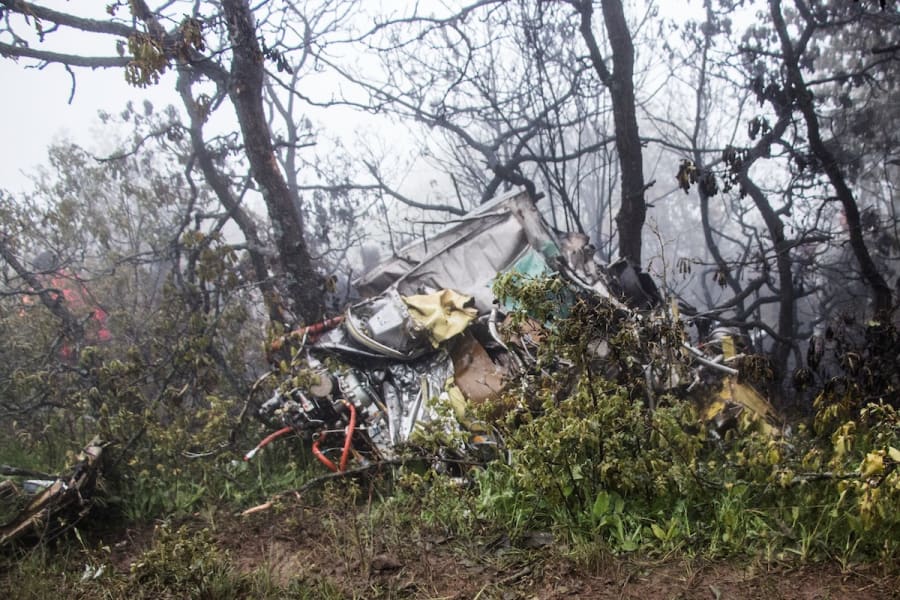Was Raisi’s death a sovereign act of God?

It really makes you wonder when you look back at Iranian President Ebrahim Raisi’s statement of April 23rd, less than a month ago, as he threatened Israel with annihilation. It was during a visit to Pakistan that Raisi referred to Israel as the “Zionist regime,” whose destruction he promised if they would dare to attack Iran.
Because when thinking about the Biblical accounts of cause and effect, it’s only natural to make the comparison of someone who, after threatening the Jews, ended up hanging on his own gallows. But who was Ebrahim Raisi, and is it possible to connect his sudden and unexpected demise to a sovereign act of God – even in the year 2024?
At age 63, Raisi, whose full name was Raisolsadati, was the son-in-law of a prominent Imam. He became Iran’s eighth president in 2021. As a prosecutor and Deputy Chief Justice of Iran, he rose to prominence as the country’s president when appointed by the Supreme Leader Ali Khamenei. Earning for himself a fearsome reputation, he was labeled “The Butcher of Tehran,” “responsible for the execution of thousands of political prisoners, accused of crimes against humanity by international human rights organizations and United Nations special rapporteurs.”
You’d be hard-pressed to find an individual who was more of a hardliner in Iranian politics than Raisi, and, perhaps, that accounts for the remark made by IDF Intelligence Chief Major General Tamir Hayman who commented, upon hearing his demise, that “it would be hard to find someone worse.”
But it wasn’t only in April that Raisi threatened Israel’s existence. He made that same promise back in May 2023 when he, once again, warned Israel not to “launch a direct military strike on his country which would be overwhelmed and destroyed by Iran’s immediate response.”
Always referring to Israel as the “Zionist regime,” it was Raisi’s intent to smear the Jewish homeland as an entity that had no right to exist, due to its foundational belief that there should be a protective refuge for all Jews who, for thousands of years, never had the security of knowing if they’d be banished from their host countries or even worse.
As the mouthpiece for the Islamic Republic’s supreme leader, Khamenei, he would voice his threats, using his legal training, something which a cleric was incapable of doing but probably considered effective by the same man who appointed him to the office in which he served over the course of three years.
The man who donned a black turban, signifying lineage to the prophet Mohammed, was notorious for terrifying the Iranian people, who suffered tremendously under his suffocating grip. Ruling with a tight fist, he made sure no one got out of line, putting an end to rising protests that erupted from time to time. In fact, it was during the period when 22-year-old Mahsa Amini, died following her arrest, for not adhering to the strict hijab rules of the country, that Raisi cracked down on the ensuing protests that arose by many Iranians, especially women, who saw Amini’s death as the ultimate price paid for the freedom which had been taken from them.
Even though all opposition was quelled, there, nonetheless, remained a large, seething resistance by many of the Iranian people, who have lived under the hand of tyranny since the Pahlavi dynasty was overthrown in 1979 and Iran became an extreme Islamic state. So, one can only wonder how Iranian citizens are feeling on the morning after their greatest oppressor has fallen.
Which raises the question – what should we think when a cataclysmic, game-changing event, such as the sudden death of a tyrant takes place, at a time when it almost appeared as if he held the fate of Israel in his hand?
For one thing, Raisi’s death serves as a much-needed reminder that no man, regardless of how powerful, threatening or fearful he sounds, has the ability to override the plans and purposes of God, Almighty who established Israel and has sustained her throughout 2,000 years of dispersion to the four corners of the earth, returning her back to the land which He promised them!
History has shown us that when individuals rise up, with the express goal of eliminating the Jews, it is those very people who end up in the dustbin of the ages, confirming that there is only one Sovereign Master whose authority is unrivaled and unparalleled. To attempt the usurping of that place is to ensure one’s own swift end, and that is why the timing of Raisi’s death comes into question, just weeks after he took it upon himself to stand in the place of the divine Creator!
In fact, there is a Biblical account, found in the prophetic book of Daniel, which has startling similarities to this Raisi story. It unfolds in the fifth chapter when Belshazzar, the then king of Babylon gives orders to drink wine from the sanctified temple vessels – representing an act of defiance to the Most High God. It was what followed that act of desecration that bears the resemblance to today’s incident.
“Suddenly, the fingers of a man’s hand emerged and began writing opposite the lampstand on the plaster of the wall of the king’s palace. The king’s face grew pale and his knees began knocking together.” After summoning Daniel, the prophet began by recalling that Belshazzar’s father, King Nebuchadnezzar’s “heart was lifted up and his spirit became so proud that he behaved arrogantly, causing him to be deposed from his royal throne and having his glory taken away from him.”
He went on to say that, just as his father, he, too, did not humble his heart, knowing what fate had unfolded upon his father as a result. The inscription read, “God has numbered your kingdom and put an end to it. You have been weighed on the scales and found deficient. Your kingdom has been divided and given over to the Medes and Persians.”
That very night, the king met his end.
The lesson to be learned, here, is that whenever someone dares to arrogantly take the place of God, they should be prepared to face the consequences. So, yes, it’s entirely possible that the death of Iran’s President Ebrahim Raisi was a sovereign act of God which resulted from his defiance of the Almighty who is the giver and taker of life – not solely of people, but of governments, leaders and countries as well.
No one and nothing can override or revoke God’s promise to guard and protect Israel from those who would destroy her, because it’s important to remember that “He who touches Israel, touches the apple of His eye.” Zechariah 2:8

A former Jerusalem elementary and middle-school principal who made Aliyah in 1993 and became a member of Kibbutz Reim but now lives in the center of the country with her husband. She is the author of Mistake-Proof Parenting, based on the principles from the book of Proverbs - available on Amazon.













